How to Set Up Shipping Rules Using Volume-Based Rate Calculation in Shopify Advanced Shipping Calculator
GENERAL
ADVANCED SHIPPING SETTINGS
SHIPPING PROFILE & ZONES
SHIPPING RULE/RATE SETUP
SHIPPING RULE/RATE SETUP USING CARRIER RATES INTEGRATION
SHIPPING RULES IMPORT/EXPORT FUNCTIONALITY
MERGING MULTIPLE SHIPPING RULES
PRODUCT DIMENSIONS SETUP
HISTORY/AUDIT TRAIL
COMMON ISSUES & FAQs
What You Will Learn in This Article:
- What Volume-Based Rates are and how they work
- The key features of Volume-Based Rates in the Advanced Shipping Calculator app
- A hypothetical scenario illustrating the potential benefits of implementing Volume-Based Rates
- Step-by-step instructions for setting up Volume-Based Rates
- Practical examples of Volume-Based Rate calculations
- Best practices and use cases for Volume-Based Rates
- How to optimize your shipping strateg y using Volume-Based Rates
Introduction
Volume-Based Rates offer a sophisticated method to calculate shipping costs for your e-commerce business. This approach allows you to set shipping costs based on the physical dimensions of products in an order, providing an accurate and efficient way to price shipping for various package sizes. In this guide, we’ll walk you through the process of setting up shipping rules using Volume-Based Rates in the Advanced Shipping Calculator app.
Understanding Volume-Based Rates
Volume-Based Rates work by:
- Using an algorithm to pack items based on their volume
- Packing the largest (by volume) items first
- The algorithm strategically arranges items within the box, prioritizing vertical stacking along the sides of the container and placing items side by side when space allows. This approach maximizes the use of available space within each package.
- Selecting the most appropriate package size for the order
- Calculating shipping costs based on the chosen package
Key Features of Volume-Based Rates
When setting up Volume-Based Rates in the Advanced Shipping Calculator app, you have access to the following features:
- Multiple package definitions: Define various box sizes to accommodate different order volumes
- Dimensional inputs: Set length, width, and height for each package
- Rate assignment: Assign specific shipping rates to each package size
- Weight limits: Set maximum weight limits for each package (optional)
- Padding adjustment: Reduce box size for padding to ensure secure packaging (optional)
- Base price: Add a fixed base price to the calculated rate (optional)
- Minimum and maximum rates: Set floors and ceilings for your shipping costs
These features allow for highly customizable shipping rates that accurately reflect the true cost of shipping based on package volume.
The Potential Impact: A Hypothetical Success Story
Before we dive into the step-by-step setup and examples, let’s consider a hypothetical scenario that illustrates the potential impact of implementing Volume-Based Rates.
Imagine an online store, “TechTreasures,” specializing in a variety of electronics from small accessories to larger devices. They’re facing common shipping challenges:
- Losing money on shipping larger items
- Overcharging for smaller products, leading to cart abandonment
- Customer complaints about inconsistent shipping costs
TechTreasures decides to implement Volume-Based Rates using the Advanced Shipping Calculator. They follow these steps:
- Accurately measure and update dimensions for all products
- Analyze common order combinations to define appropriate box sizes
- Set up Volume-Based Rate rules in the Advanced Shipping Calculator
If successful, TechTreasures could potentially see results like:
- Decrease in overall shipping costs
- Drop in cart abandonment rate
- Improved customer satisfaction scores
- The ability to offer free shipping on orders over a certain threshold
While this is a hypothetical scenario, it demonstrates the potential benefits of implementing Volume-Based Rates. Many businesses facing similar challenges could achieve comparable improvements in their shipping strategy.
Now, let’s walk through the actual setup process and explore some examples to help you implement Volume-Based Rates for your own business.
Step-by-Step Setup Guide
Before you begin setting up Volume-Based Rates, it’s crucial to ensure that all your products have accurate dimensions set up. Volume-Based Rates rely on these dimensions to calculate the most appropriate package size for each order.
For detailed information on why product dimensions are essential and how to add them, please refer to these resources:
Once you’ve ensured all your products have accurate dimensions, follow these steps to set up Volume-Based Rates in the Advanced Shipping Calculator app:
- Open the Advanced Shipping Calculator app and navigate to the shipping rules workspace
- Click Advanced Shipping Calculator on the left side menu, and then select the Shipping Zone for which you want to add the rule
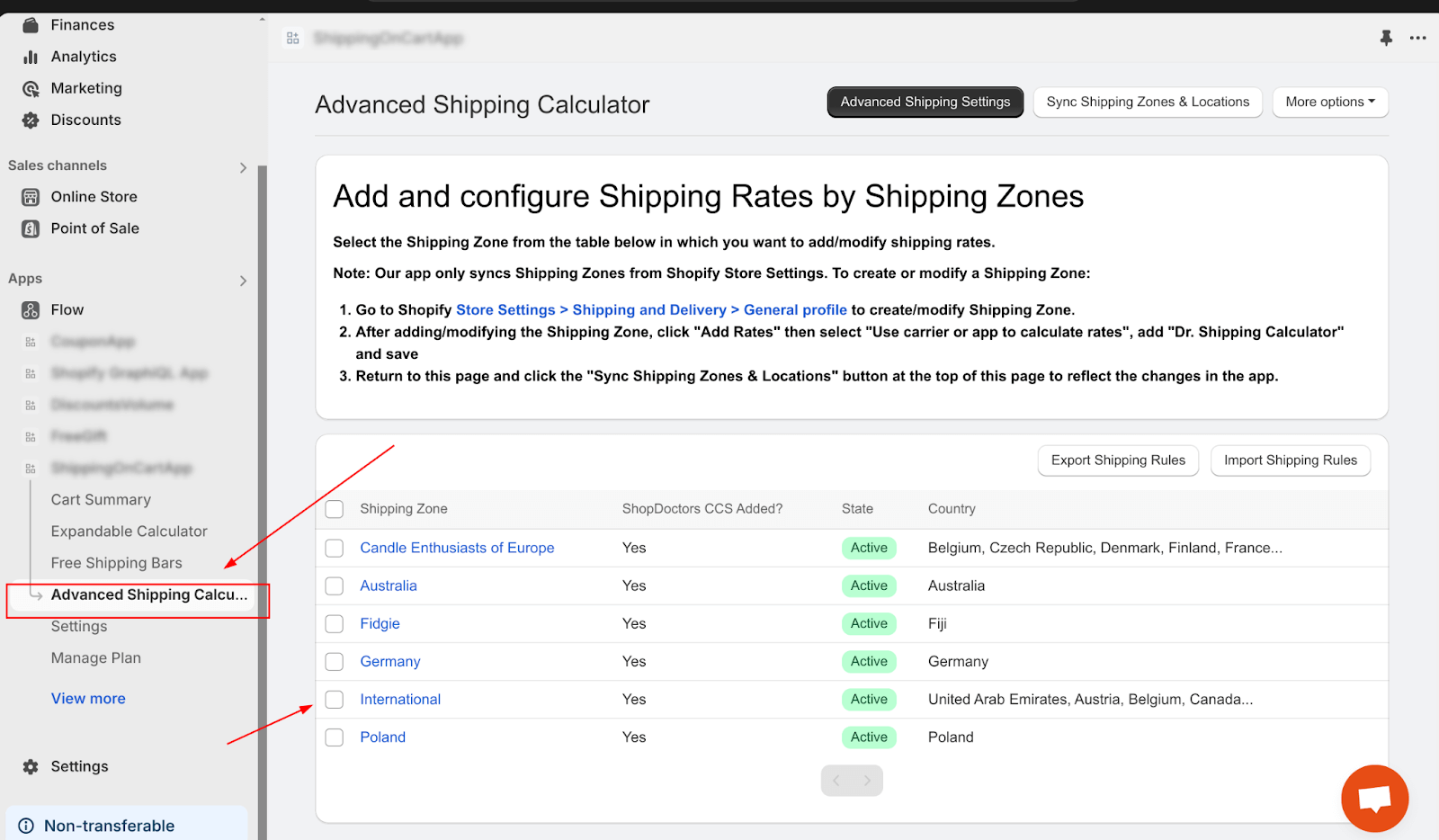
-
- Click the “Add Shipping Rule” button
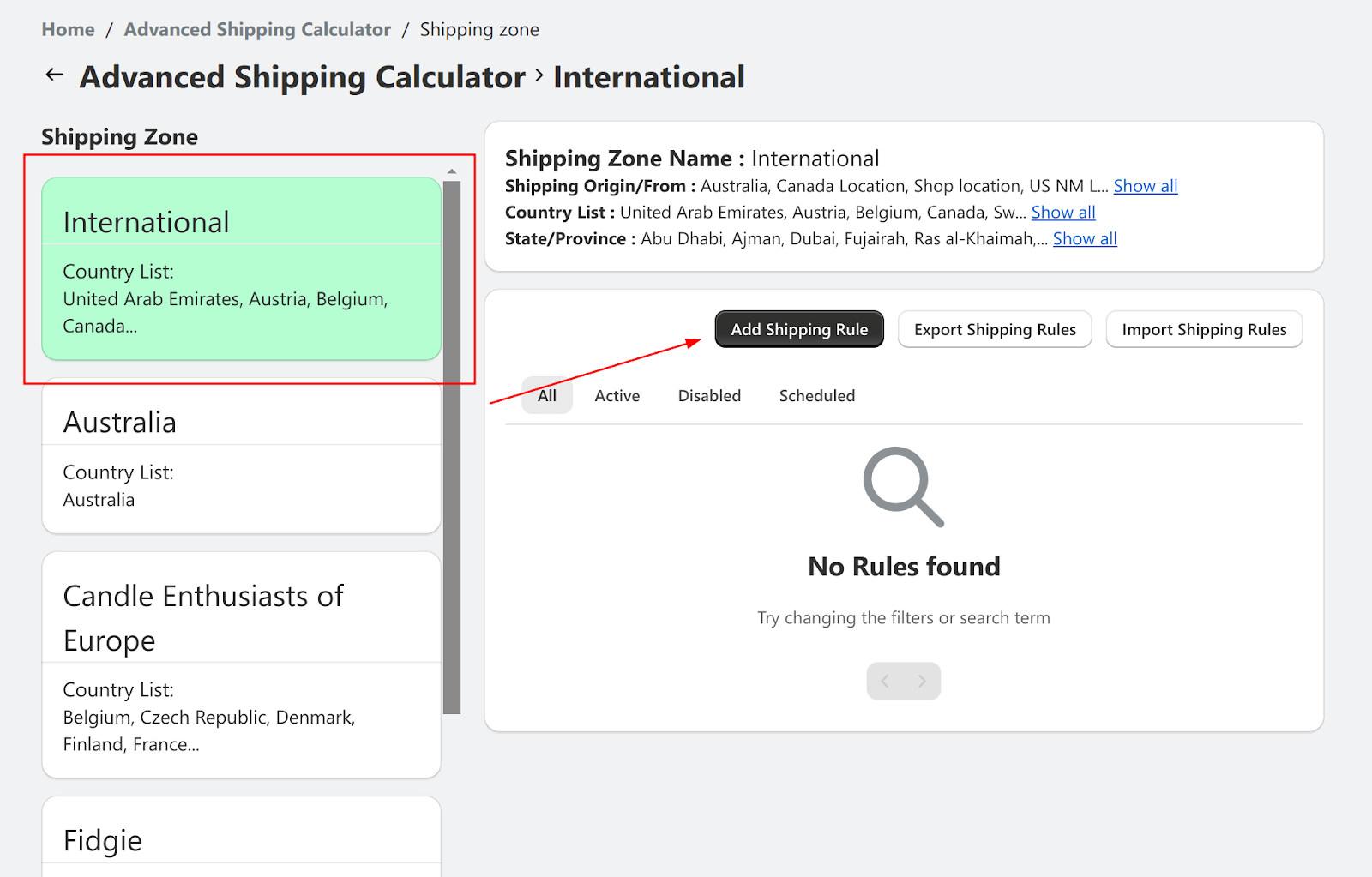
- Fill in the General Shipping Rule information and specify filters for which the rule should be applied (this includes location and conditions for cart, product, or customer). For more details, see “Anatomy of Shipping Rules and Rates: A Comprehensive Guide to the Advanced Shipping Calculator Rule Configurator”
- Go to Shipping Rate Calculation and for “Select Rate Type” field, choose “Volume-Based Rate” option
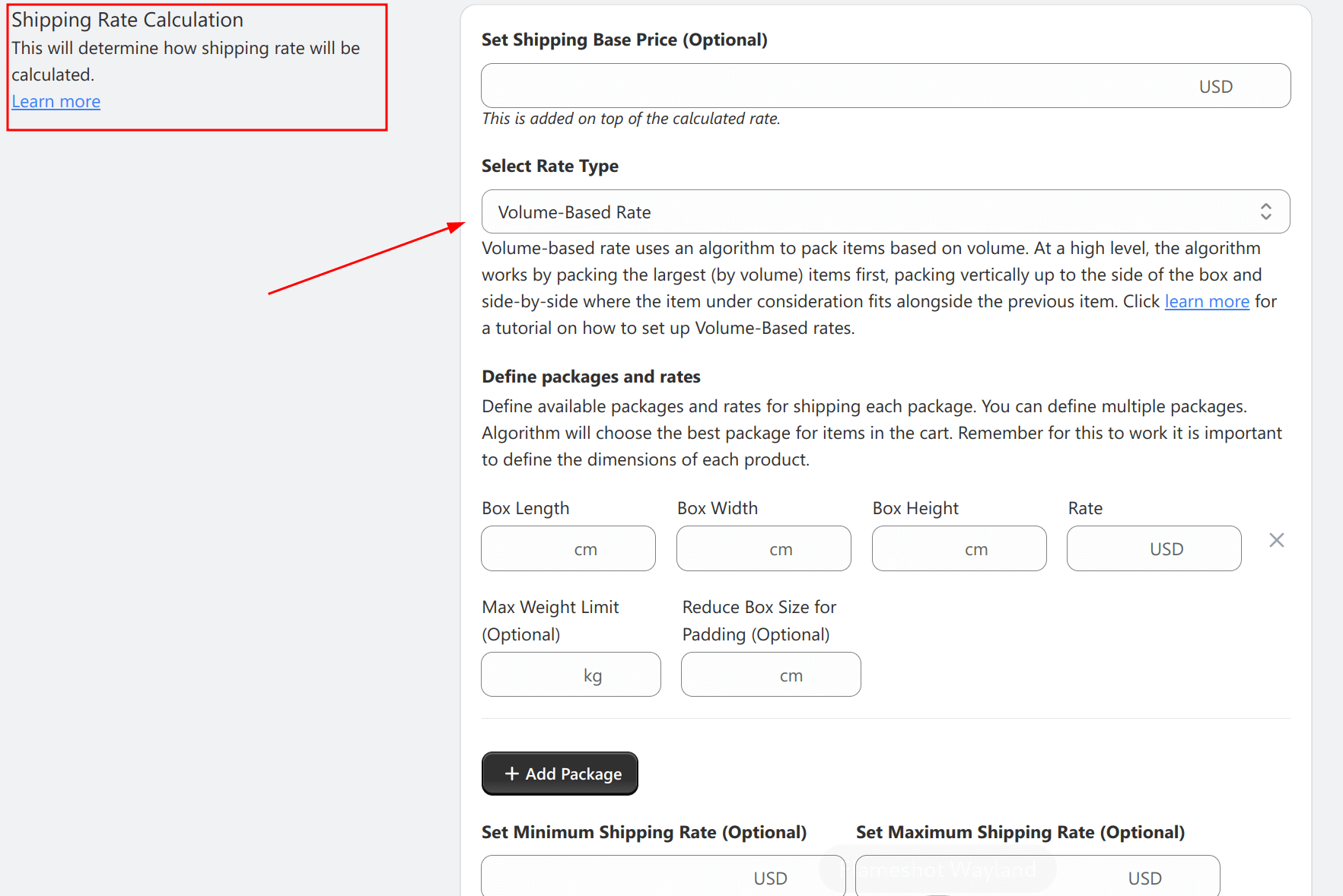
- Set a Shipping Base Price (Optional): If you set one, this is added on top of the calculated rate
- Define packages and rates:
- Enter Box Length, Box Width, and Box Height for each package size
- Set the Rate for each package
- (Optional) Set Max Weight Limit for each package
- (Optional) Set Reduce Box Size for Padding
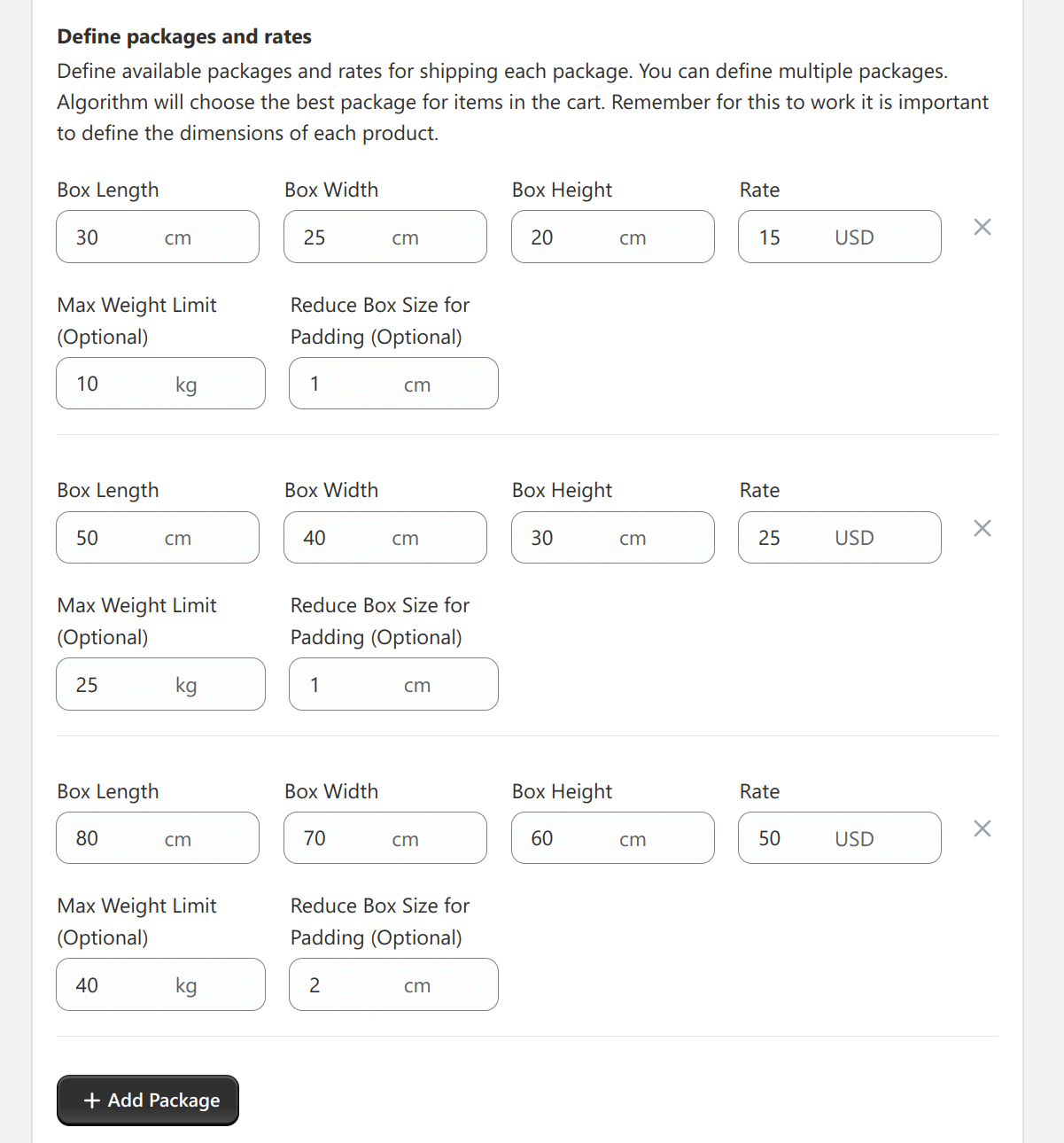
- (Optional) Set excluded products in the calculation for the Volume-Based Rule. Excluded products will not be considered when attempting to automatically pack an order into predefined packages. To learn more about the product exclusion functionality, read this article.

- (Optional) Set Minimum and Maximum Shipping Rates to ensure your shipping costs stay within a desired range
- Review and save your settings
Examples of Volume-Based Rate Calculations
To help you better understand how Volume-Based Rates work in practice, let’s look at some examples. These scenarios will demonstrate how the Advanced Shipping Calculator determines shipping costs based on product dimensions and the packages you’ve defined.
Remember, the effectiveness of Volume-Based Rates depends on accurate product dimensions and well-defined package sizes. The following examples assume that all products have correct dimensions set in Shopify and that appropriate shipping packages have been defined in the Advanced Shipping Calculator.
For all the following examples, we’ll use an already defined packaging setup:
- Small Box: 30cm x 25cm x 20cm – Rate: $15
- Medium Box: 50cm x 40cm x 30cm – Rate: $25
- Large Box: 80cm x 70cm x 60cm – Rate: $50
The items setup:
- iWatch – 5cm x 5cm x 5cm
- MacBook – 37cm x 26cm x 8cm
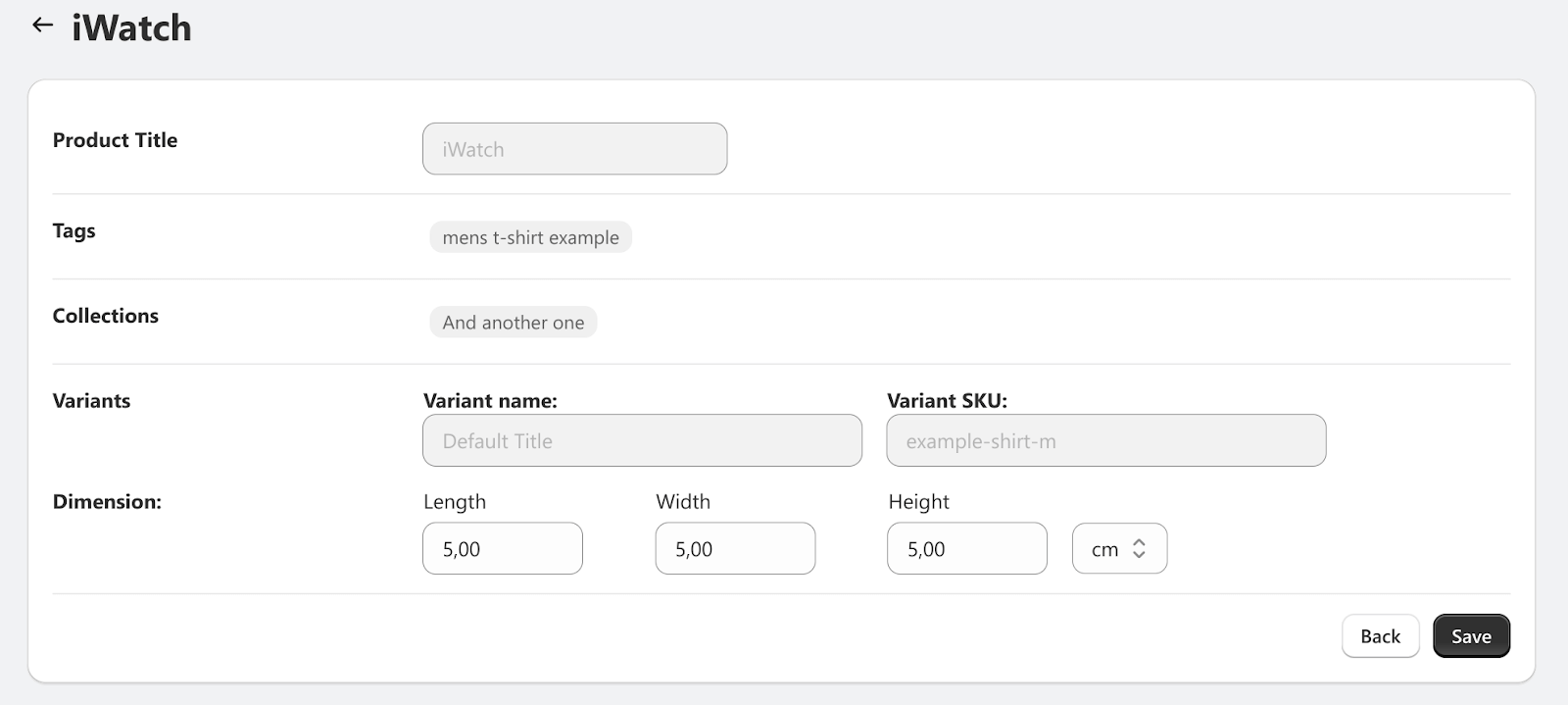
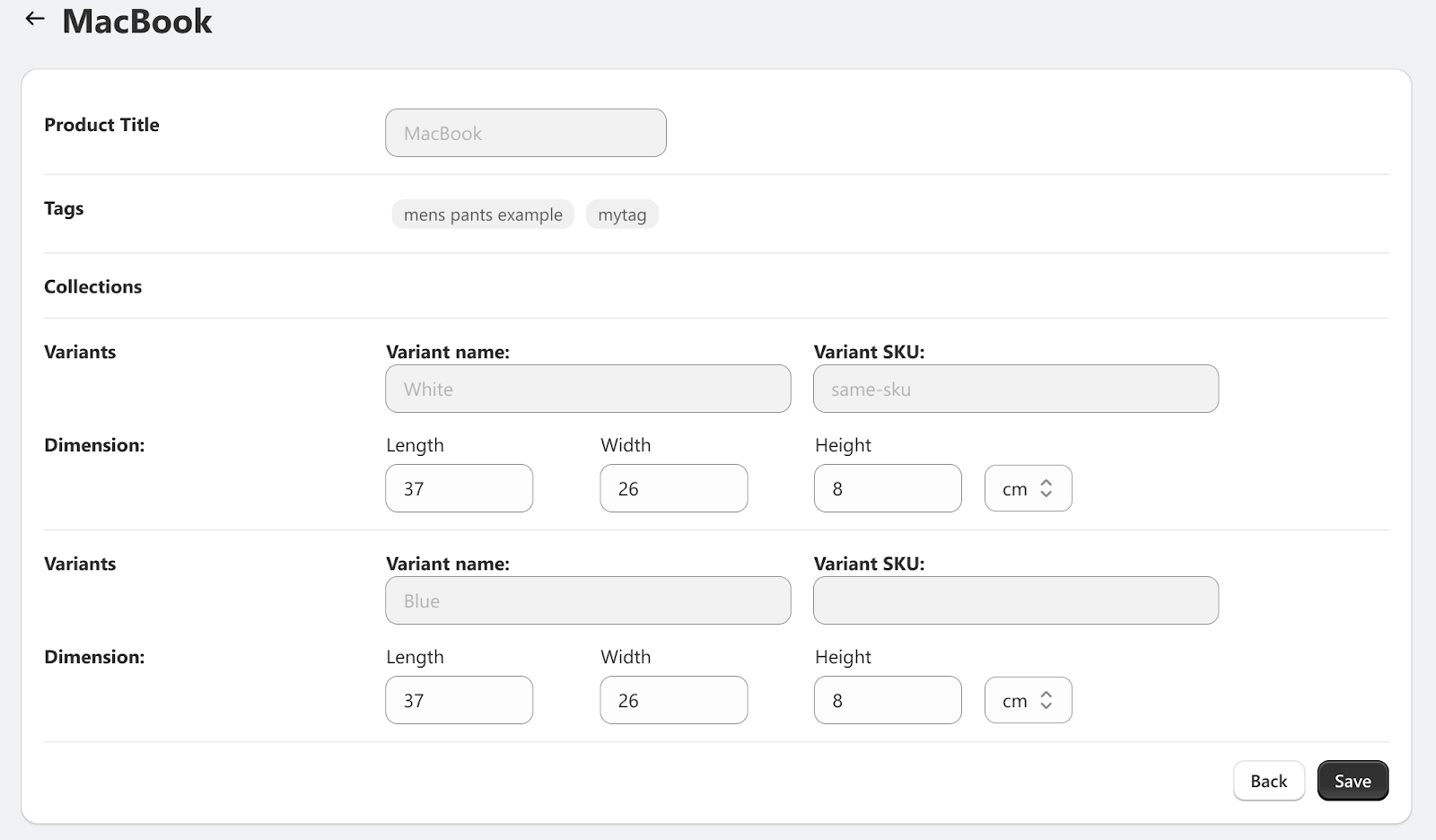
Example 1 – Bulk iWatch order – cart view
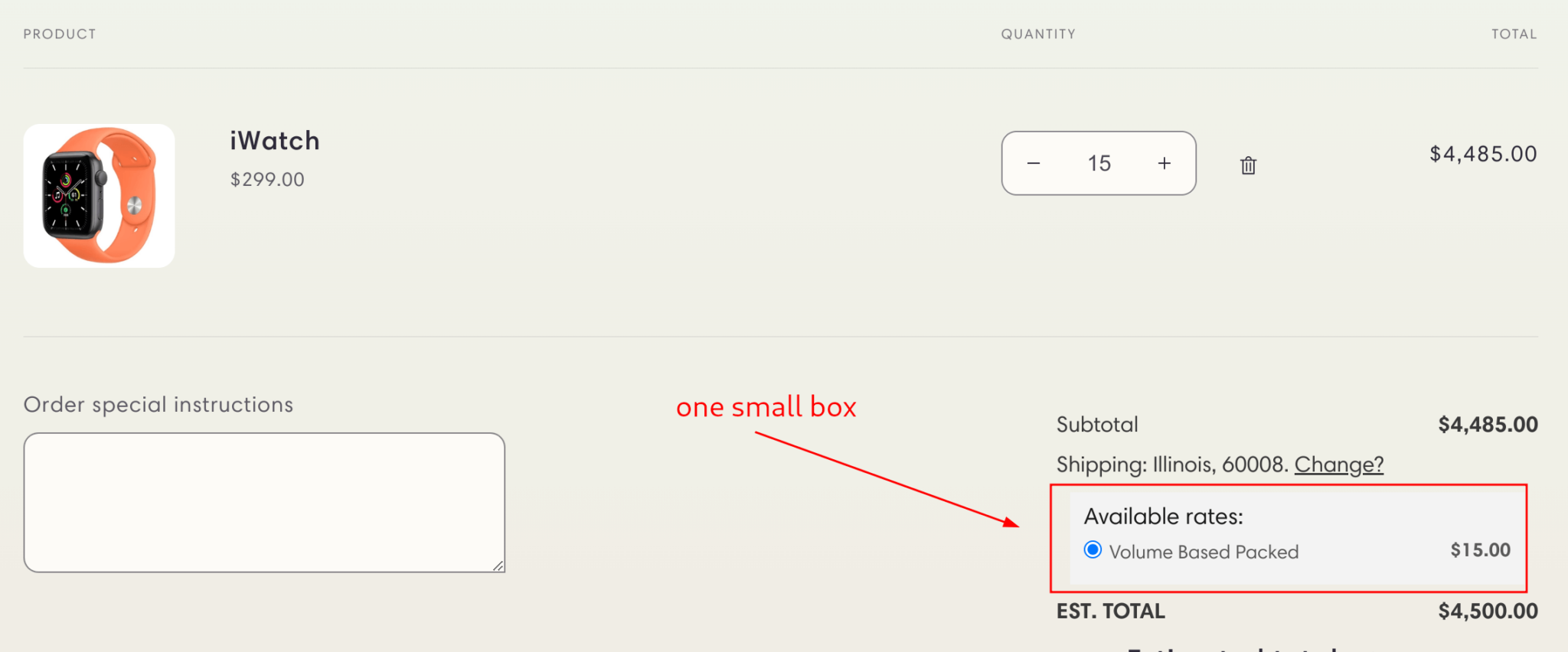
Example 2- Large bulk iWatch order – cart view
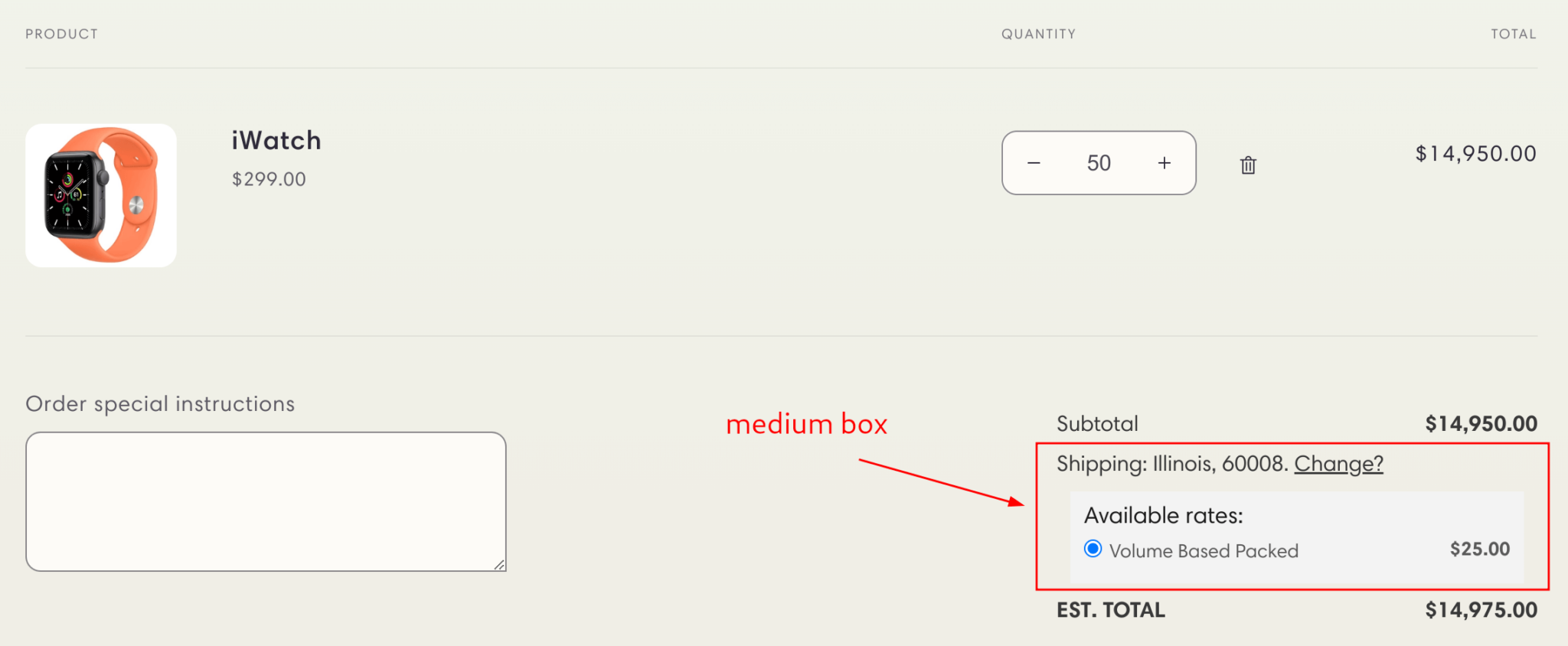
Example 3 – Large bulk iWatch order and single MacBook – cart view
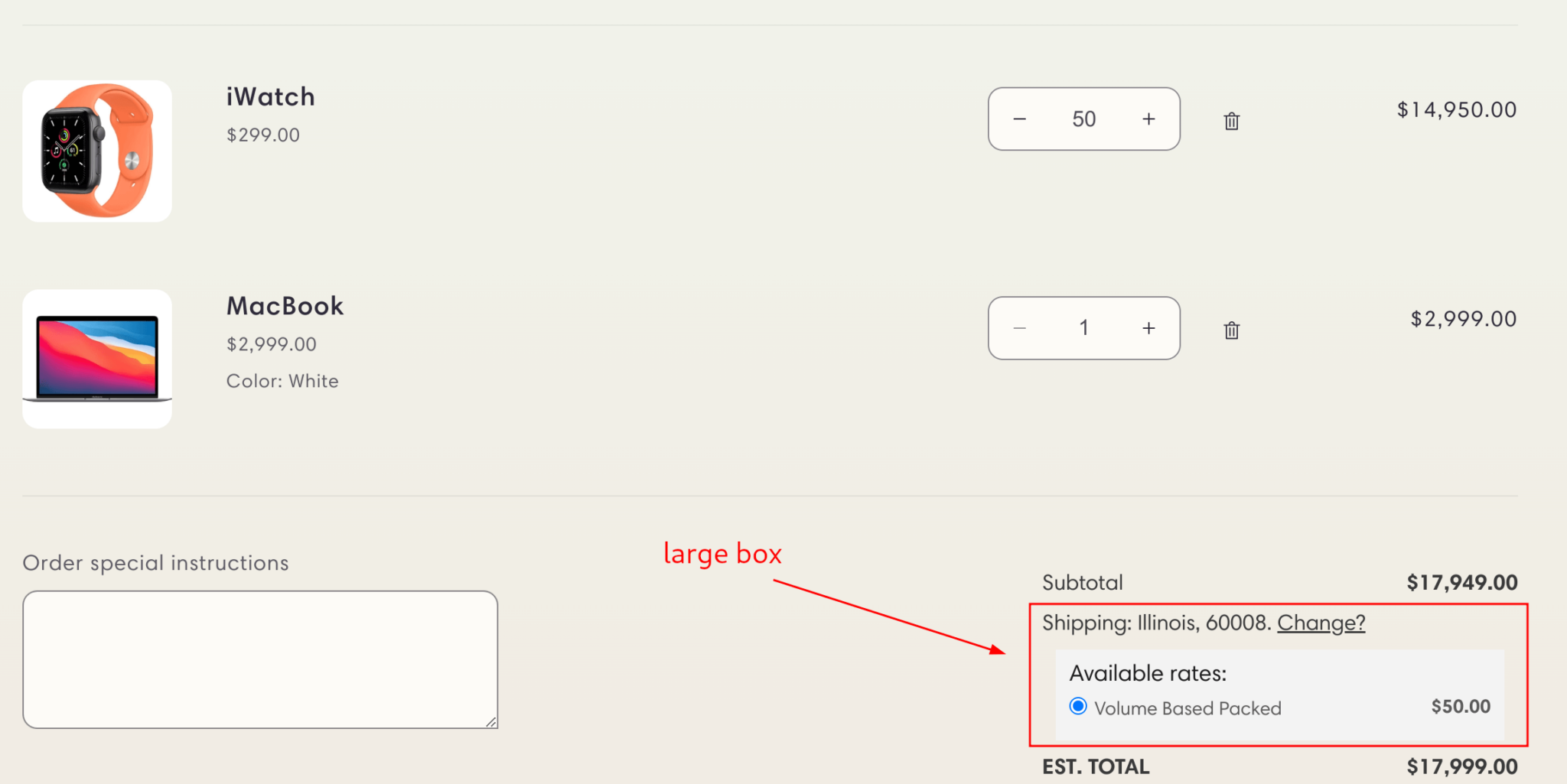
Example 4 – Bulk order of iWatch and MacBook – cart view
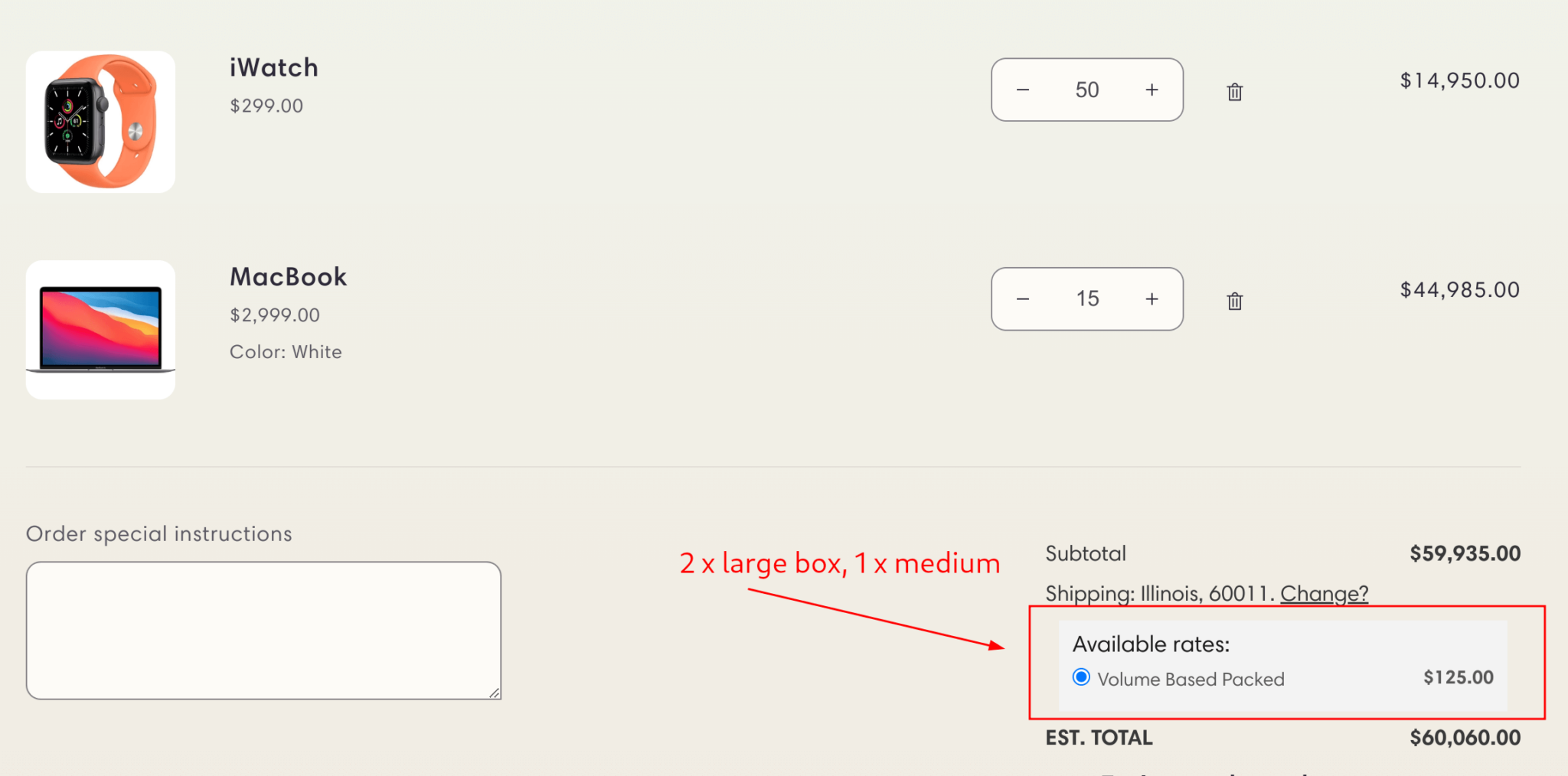
Best Practices and Use Cases
Volume-Based Rates are particularly useful for:
- Businesses with products of varying sizes
- Those wanting to optimize shipping costs based on actual package dimensions
- Companies looking to reduce shipping overcharges or undercharges
Best practices include:
- Accurately measure and input product dimensions in your inventory
- Create a diverse range of package sizes to accommodate different order combinations
- Regularly review and adjust your rates based on actual shipping expenses
- Consider the trade-off between more precise pricing and the complexity of managing many package sizes
Optimizing Your Shipping Strategy
To make the most of Volume-Based Rates:
- Analyze your order data to identify common product combinations and create appropriate package sizes
- Consider using different Volume-Based Rate rules for different product categories or shipping destinations
- Clearly communicate potential savings on shipping for efficiently packed orders to encourage smart purchasing behavior
Conclusion
Volume-Based Rates offer a precise approach to shipping calculations, providing accuracy for you and fair pricing for your customers. By following this guide and experimenting with different package configurations, you can create a shipping strategy that reflects true shipping costs while optimizing packing efficiency.
Remember, the key to successful Volume-Based Rates is finding the right balance between pricing accuracy and operational simplicity. Don’t hesitate to adjust your rates and package sizes as you learn more about your shipping patterns and customer behavior.